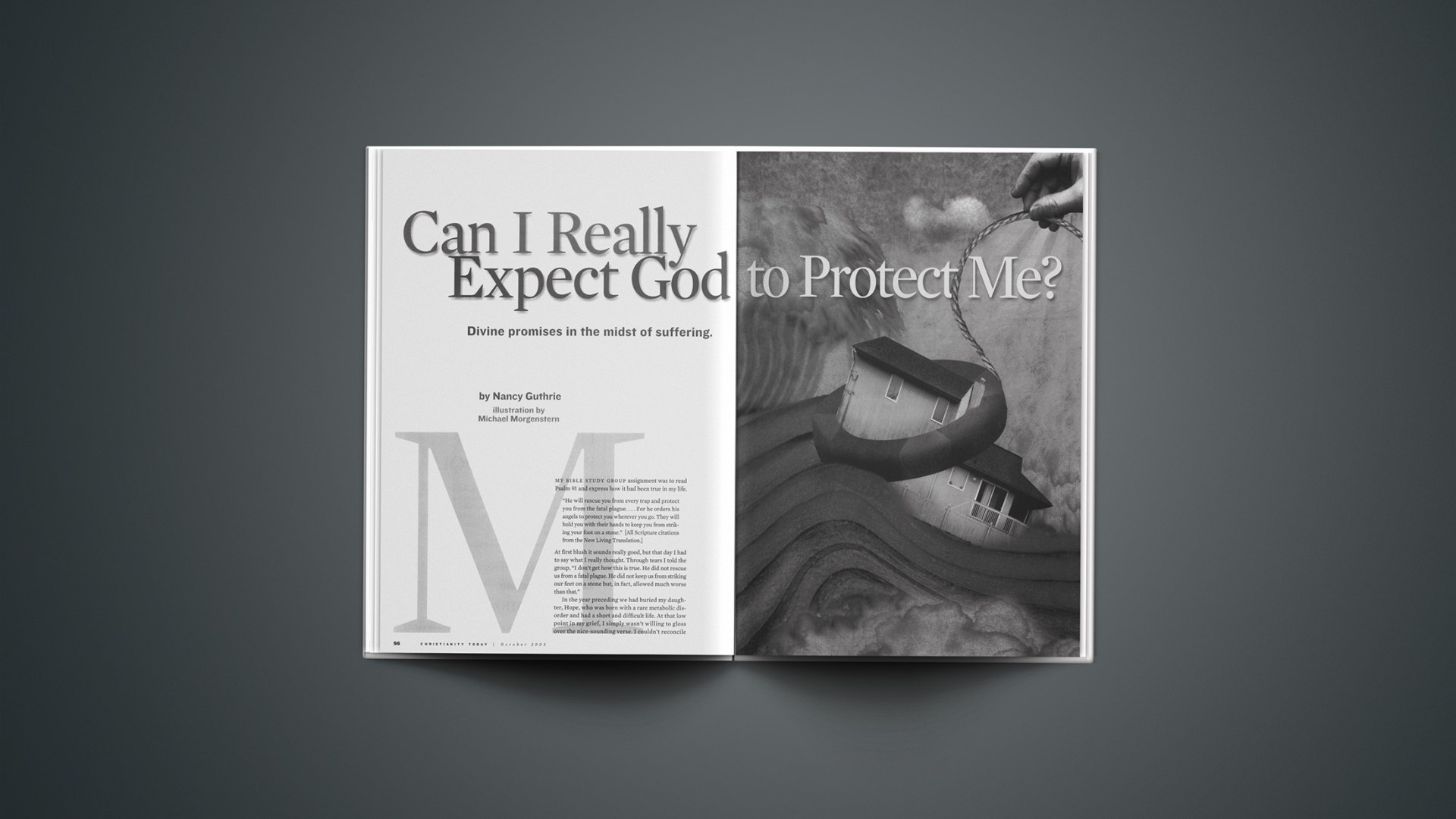| • |
My Bible study group assignment was to read Psalm 91 and express how it had been true in my life.
“He will rescue you from every trap and protect you from the fatal plague. … For he orders his angels to protect you wherever you go. They will hold you with their hands to keep you from striking your foot on a stone.” [All Scripture citations from the New Living Translation.]
At first blush it sounds really good, but that day I had to say what I really thought. Through tears I told the group, “I don’t get how this is true. He did not rescue us from a fatal plague. He did not keep us from striking our feet on a stone but, in fact, allowed much worse than that.”
In the year preceding we had buried my daughter, Hope, who was born with a rare metabolic disorder and had a short and difficult life. At that low point in my grief, I simply wasn’t willing to gloss over the nice-sounding verse. I couldn’t reconcile this passage with my experience, with reality. But I wanted to. I wanted to figure out how the scriptural promises of protection apply not only to me, but also to anyone who suffers, especially now, the thousands who have endured homelessness, disease, and death in the wake of Hurricane Katrina. I wanted to know, Can I expect God to protect me? And if not, what are these promises of protection in the Bible all about?
Our True Enemy
I began in the Psalms, because they are filled with requests for and proclamations of divine protection. Most of them have to do with protection from “my enemies.” For example, Psalm 59:9-10 reads, “You are my strength; I wait for you to rescue me, for you, O God, are my place of safety. In his unfailing love, my God will come and help me. He will let me look down in triumph on all my enemies.”
Frankly, I have often been confused. Some of the things the biblical writers ask God to do to their enemies, I wouldn’t wish on anyone! A sermon I heard on Isaiah finally helped me to make sense of this. Because the children of Israel and their God-appointed leaders were God’s chosen people, friends of Israel were friends of God, and enemies of Israel were enemies of God. God’s enemies are those who love themselves more than God, those who reject and refuse the gift of God in his Son, Jesus. Throughout the Old Testament story of God dealing with his chosen people, God reveals his power and his will to protect his children from enemies who would seek to do them harm.
So the challenge is to figure out, Who are our enemies? When we think about enemies, we think about bosses who seem out to get us, former spouses who want to ruin us, rivals who want to defeat us, and people who have hurt us. We think of those with ideologies and agendas at cross-purposes with ours. The truth is, we are much more concerned about having God on our side to protect our own interests and reputation than we are about being on God’s side, seeking after his glory and ultimate victory.
I figured out that God has not promised to protect me from everyone I might define as my enemy. But he has promised protection from my ultimate enemy—sin—which, because of Christ, no longer has the power to enslave me or determine my eternal destiny. We can entrust ourselves to this just, strong God, who has gone to the lengths of the Cross to protect us from any enemy that seeks to alienate us from himself.
My problem is not so much a lack of protection from God. My more significant problem is that I’m sleeping with the enemy, justifying and enjoying my sin when all along he offers me protection from its damning power.
Different Priorities
As I listened to the words of Jesus, my understanding of protection became clearer. Honestly, it wasn’t necessarily what I was hoping for.
Imagine the scene as Jesus prepared to send out his disciples in twos for ministry (Matt. 10). Far from a pump-you-up pep talk, he seemed to be preparing them for the worst. “When you are arrested, don’t worry about what to say in your defense,” he said. “Everyone will hate you because of your allegiance to me,” he predicted. And then he encouraged them not to fear those who wanted to kill them. “They can only kill your body, they cannot touch your soul” (Matt. 10:28). Gee, I think, they can kill only my body? And this should be a relief?
The fact is, God cares more about our spiritual health than our physical health. Our bodies are going to die. Our souls are going to live forever. And God’s ability to protect our souls from eternal judgment and eternal death is more significant than his ability to protect our bodies from disease or death. Trapped in these bodies and in this time, it is hard for us to grasp. So in our prayer requests for safe travel and physical health, and in our more desperate prayers amid great difficulties, we try to apply to our bodies his promises of protection for our souls, and we’re left disappointed, accusing him of falling down on the job. But we will continue to be disappointed in him until our value system lines up with his, until we value the eternal life of our souls more than the limited life of our mortal bodies, until we understand that God’s primary agenda is kingdom building. It may cost us our very lives, and he is okay with that.
Keep Them Safe from the Evil One
When we read the prayer Jesus prayed in John 17, a prayer of protection for his disciples, we can’t help feeling hopeful. Jesus prayed, “Holy Father, keep them and care for them … keep them safe from the Evil One” (John 17:11b, 15b). Surely God answers the prayers of Jesus with a resounding Yes!
As we listen in on this prayer, we can assume that God heard it and that Jesus always prayed in complete accordance with his Father’s will. So we might expect that God’s affirmative answer to Jesus’ prayer would mean that the disciples never faced any harm, right? But we know that isn’t what happened. History records that all but one of the disciples were killed for their allegiance to Christ. Only John is said to have lived to old age, and he was severely persecuted for the sake of the gospel. Most of the disciples spent years in prison and were stoned, beheaded, or crucified.
So how do we reconcile Jesus’ prayer of protection for the disciples with the reality that nearly every one of them died a martyr’s death? Is that how God protects those he loves?
Jesus asked his Father to protect the disciples and us from the Evil One because he knows that the Devil wants to destroy us. In fact, according to 1 Peter 5:8, Satan “prowls around like a roaring lion looking for some victim to devour.” Satan brings suffering to diminish our faith, he brings temptation to deceive us, and he brings doubt about God’s love and goodness to estrange us from God.
But since Jesus prayed for us, asking his Father to protect us from the Evil One, we are not at Satan’s mercy. God has answered the prayer of Jesus with a resounding Yes! While Satan may win a battle or two in the life of the believer, he will never win the war against the soul. Jesus has prayed for his own, and we are protected.
Protection from Judgment
Certainly one of the most politically incorrect words in the English language today is judgment. And to say that God will judge sin is considered an old-fashioned scare tactic. But Scripture is clear that judgment for sin is certain and will be terrifying for those who are not protected from it. Paul writes in Romans, “There is going to come a day of judgment when God, the just judge of all the world, will judge all people according to what they have done. … He will pour out his anger and wrath on those who live for themselves, who refuse to obey the truth and practice evil deeds” (2:5-6, 8). We would much rather talk about God’s love than God’s wrath, but isn’t it a relief to know that evil in this world will not go unpunished, that justice will be done? At least it’s a relief until I look into my own heart and recognize that the evil within me deserves nothing less than judgment.
God knows that you and I need protection from judgment, which is going to fall, flowing out of divine justice. So he sent us a Protector in the form of a vulnerable baby, a Savior who is no less than his own Son. “For God did not send his Son into the world to condemn the world, but to save the world through him” (John 3:17). As we hide ourselves in the person and work of Jesus, we find shelter from the sure and certain judgment of the last day.
But Jesus is able to protect us from judgment only because there was no protection for him. As Jesus hung on the Cross, he absorbed judgment in our place so that we might be protected from it. “Since we have been made right in God’s sight by the blood of Christ, he will certainly save us from God’s judgment” (Rom. 5:9). When I see him there, no longer can I harbor resentment that he hasn’t come through for me in the way I have wanted. I realize he has paid the ultimate price so that I might be protected from the judgment I deserve.
So can I expect God to protect me, and anyone devastated by a tragedy as big as Katrina? Absolutely! I’ve come to see that his “protection plan” is more vast and far-reaching than my shallow expectations once defined. I see now that God’s promises for protection go much deeper than protecting my body or my agenda or my plan for my life. I can rest easy. I’m protected.
Nancy Guthrie is the author of Holding on to Hope: A Pathway Through Suffering to the Heart of God, as well as the newly released One-Year Book of Hope, a daily devotional.
Copyright © 2005 Christianity Today. Click for reprint information.
Related Elsewhere:
Nancy Guthrie’s Holding on to Hope: A Pathway Through Suffering to the Heart of God and The One Year Book of Hope are available from Christianbook.com and other book retailers.
More about Nancy Guthrie is available from her website.
More information about Holding on to Hope and The One Year Book of Hope is available from Tyndale House Publishers.
Guthrie is also the author of Praying for Hope | What a dying infant taught her mother about God’s ways.
The Dick Staub Interview also featured Nancy Guthrie’s story of having two babies with the fatal disease, Zellweger Syndrome.
More CT articles about suffering include:
Baptism + Fire | Suffering may build character, but ultimately it’s not about us. (Nov. 30, 2004)
Wind of Terror, Wind of Glory | We cannot know God’s majesty without his terrible holiness. (Sept. 24, 2004)
Why Suffering? | A young director’s documentary is thin on theology but rich with compassion. (June 13, 2002)
CT Classic
The Suffering Church | Increasingly, Christians are harassed, arrested, interrogated, imprisoned, fined, or killed because of their religious beliefs and practices. (May 2, 2002)










